Unit 5 The power of the nature Learning about language精品课件
文档属性
| 名称 | Unit 5 The power of the nature Learning about language精品课件 | 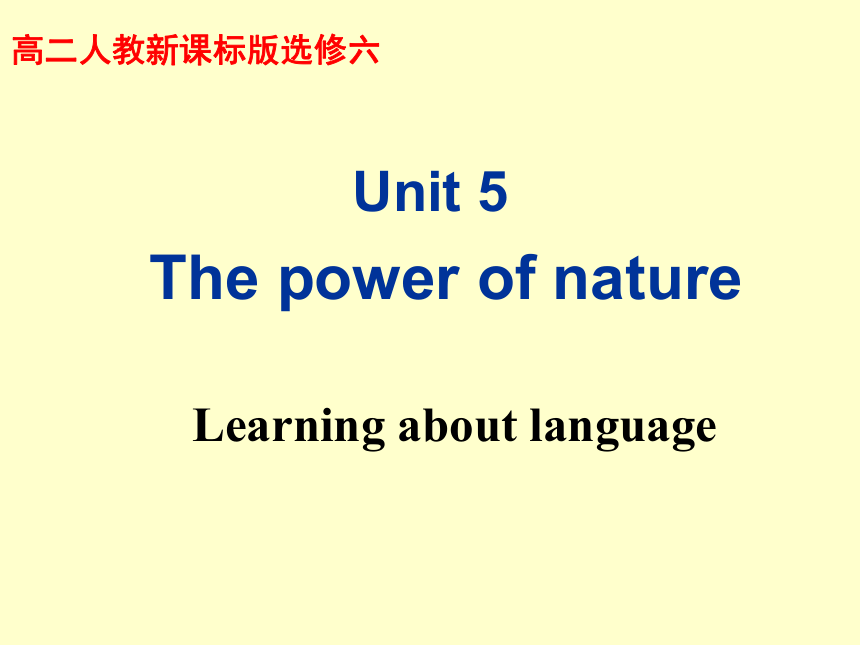 | |
| 格式 | rar | ||
| 文件大小 | 449.2KB | ||
| 资源类型 | 教案 | ||
| 版本资源 | 人教版(新课程标准) | ||
| 科目 | 英语 | ||
| 更新时间 | 2011-05-29 18:09:34 | ||
图片预览

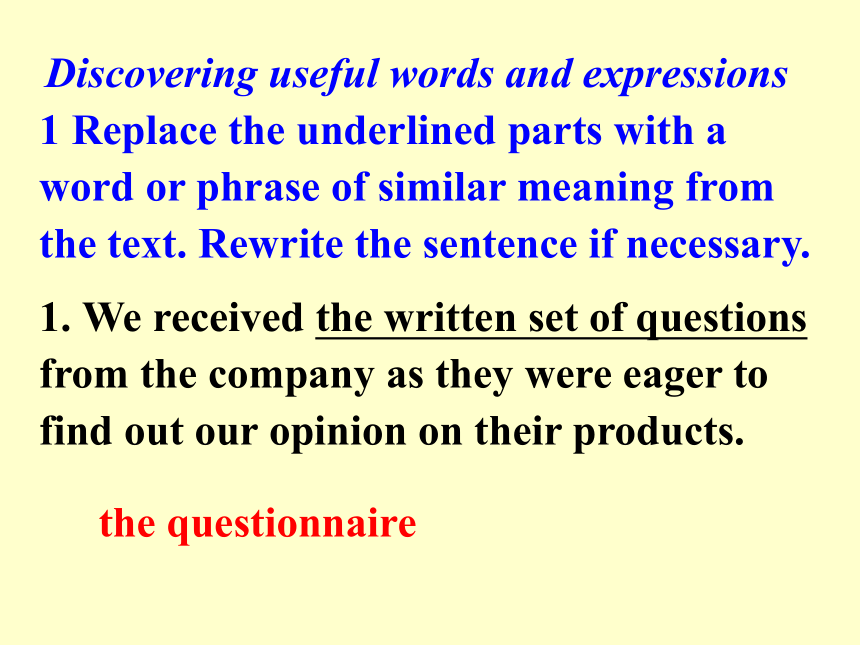
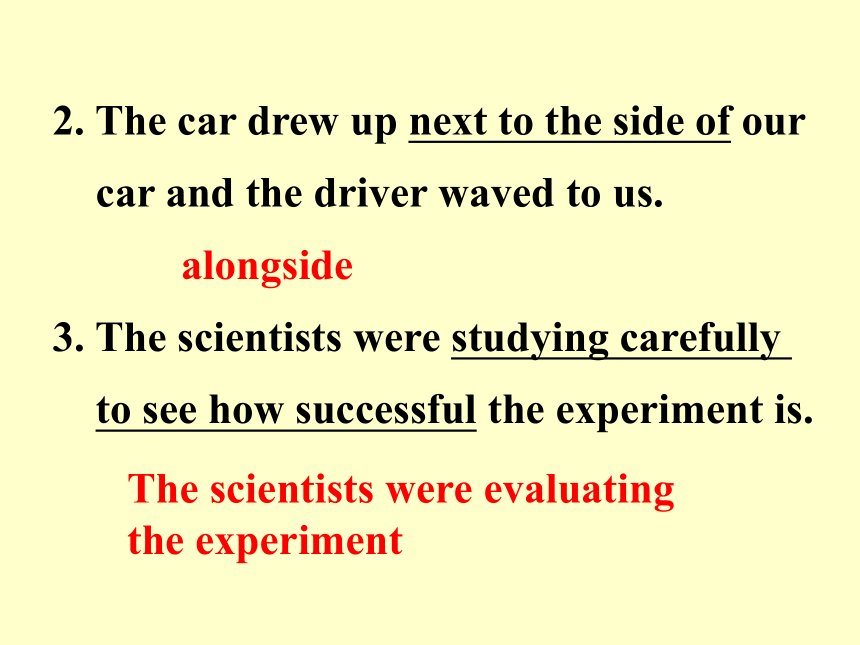
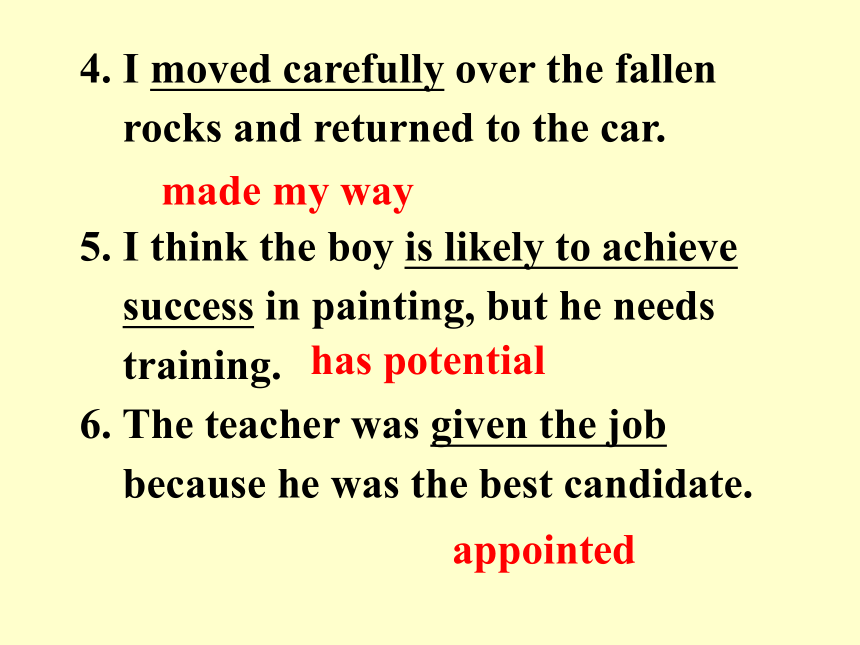

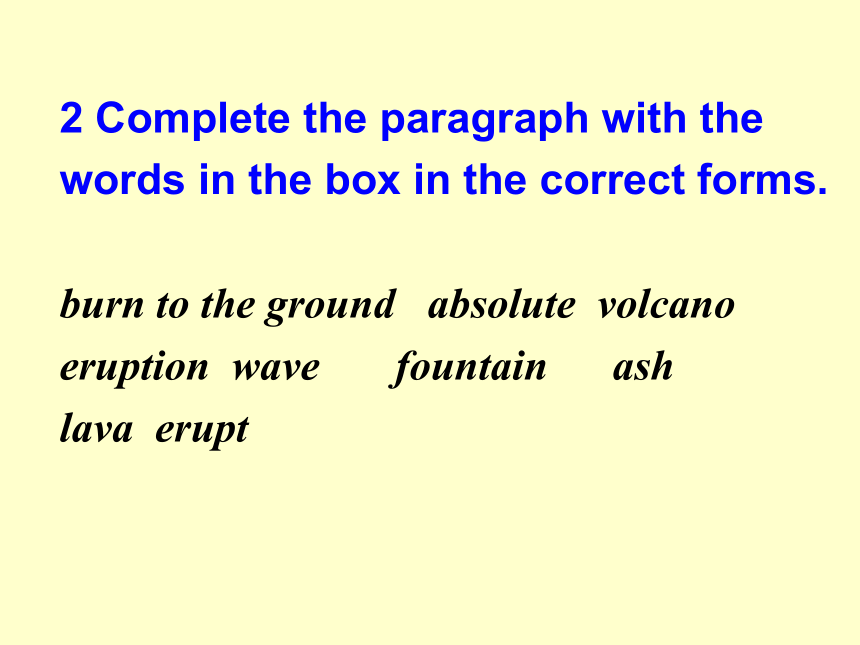
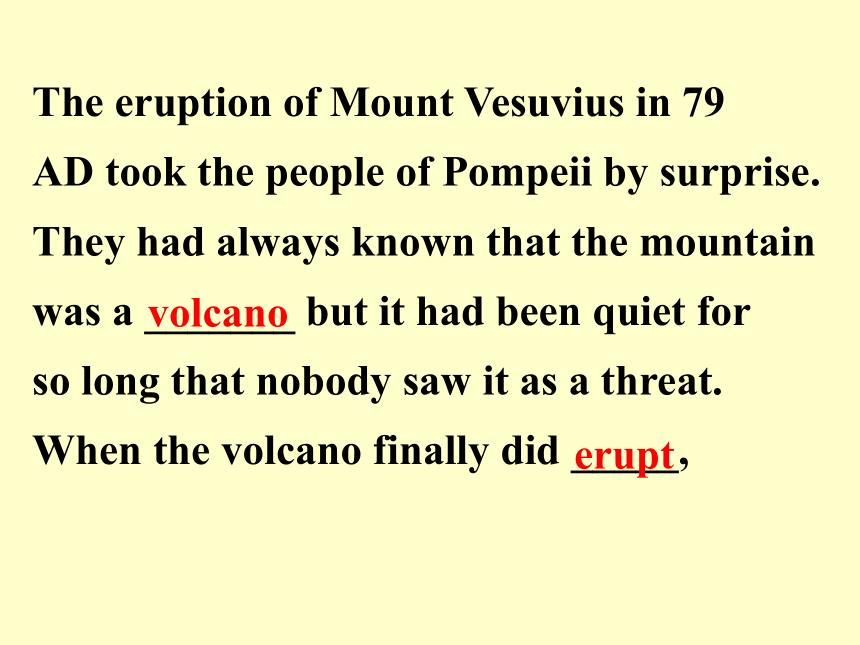
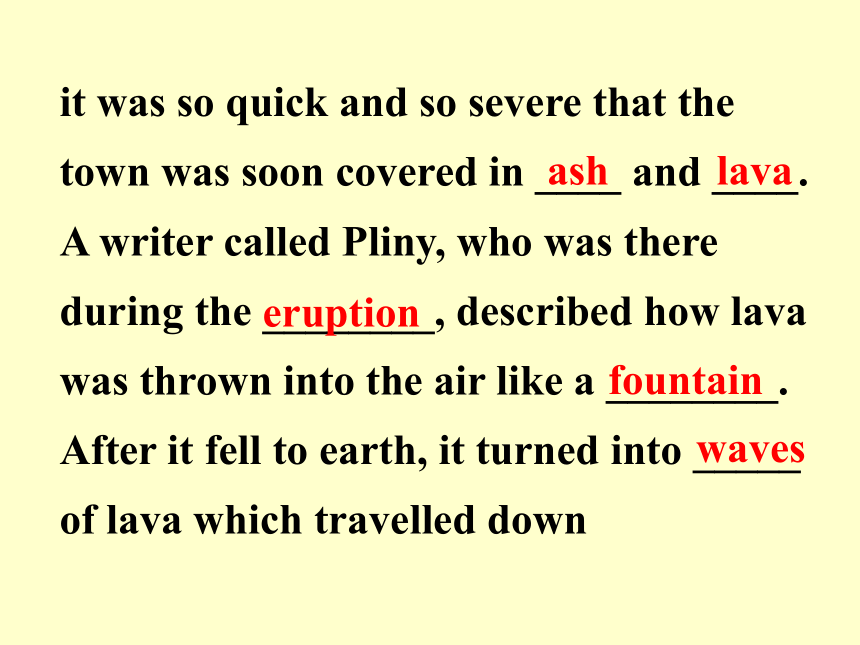
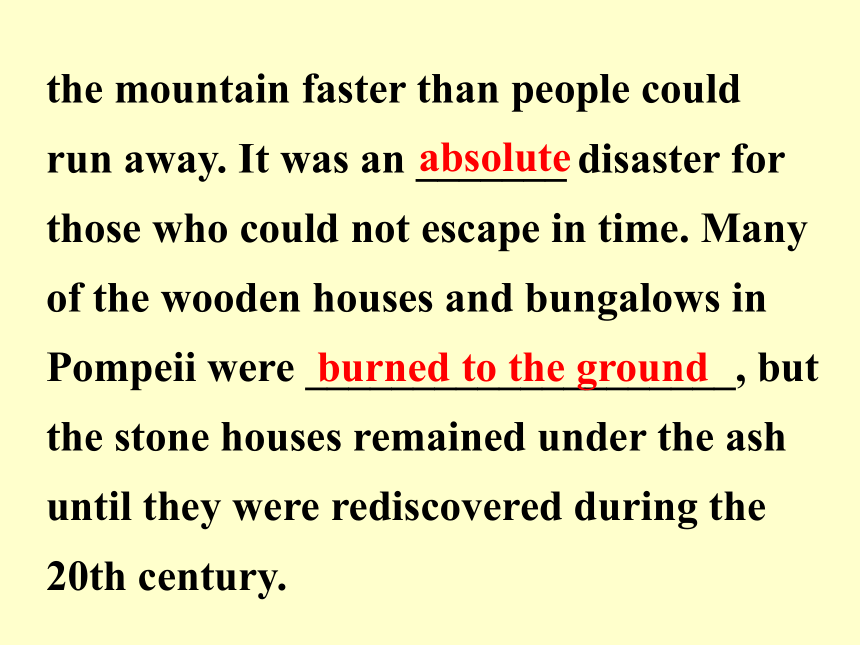
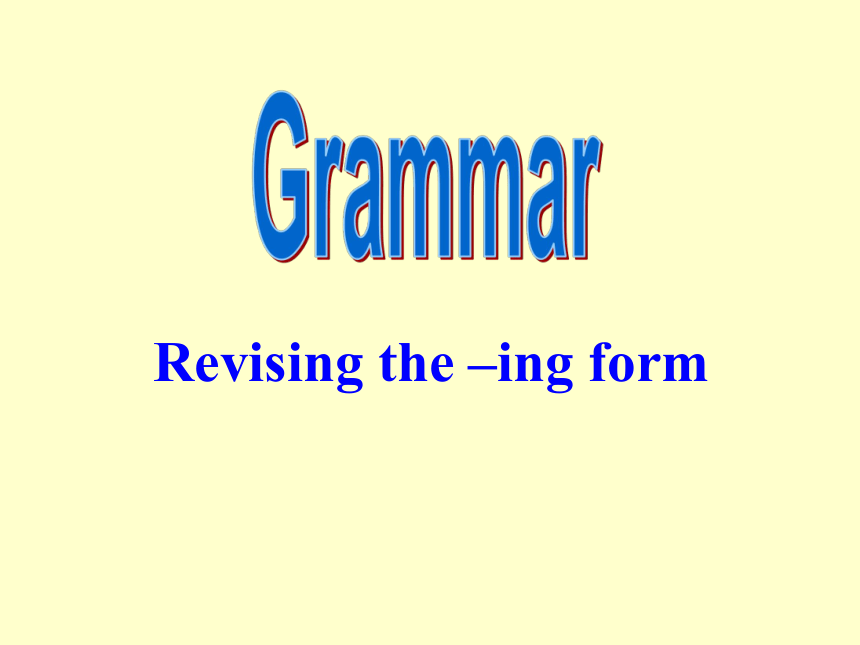
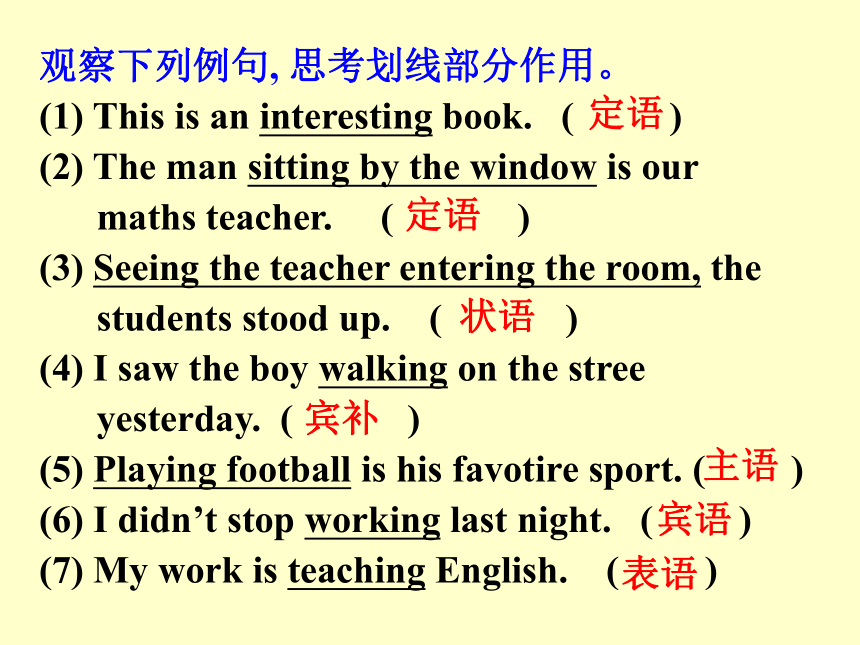
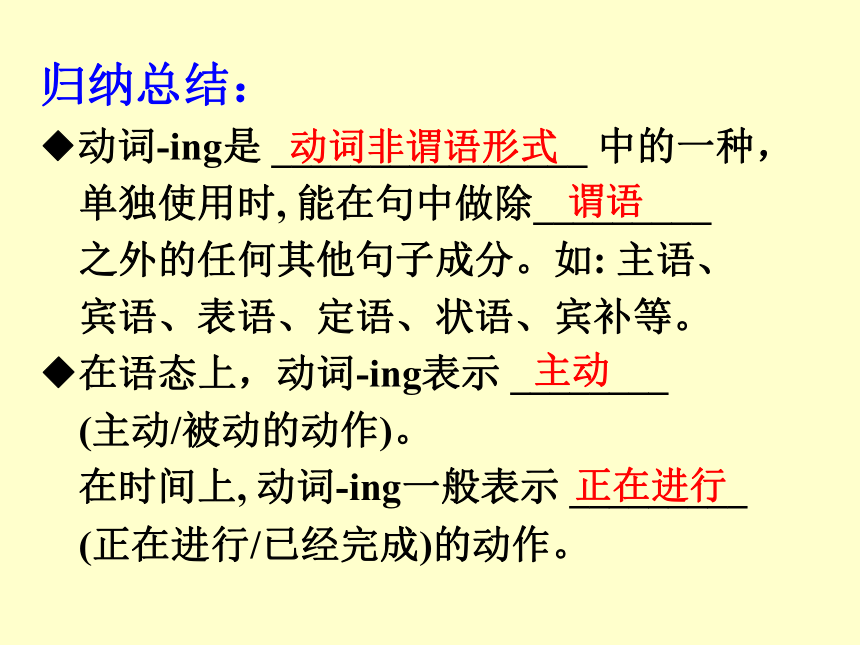
文档简介
(共58张PPT)
Unit 5
The power of nature
Learning about language
高二人教新课标版选修六
Discovering useful words and expressions
1 Replace the underlined parts with a word or phrase of similar meaning from the text. Rewrite the sentence if necessary.
We received the written set of questions
from the company as they were eager to
find out our opinion on their products.
the questionnaire
2. The car drew up next to the side of our
car and the driver waved to us.
3. The scientists were studying carefully
to see how successful the experiment is.
alongside
The scientists were evaluating the experiment
4. I moved carefully over the fallen
rocks and returned to the car.
5. I think the boy is likely to achieve
success in painting, but he needs
training.
6. The teacher was given the job
because he was the best candidate.
made my way
has potential
appointed
7. It is certain that the factory will
greatly raise their efficiency if
they have modern machines and
tools.
8. Charles looked at the drawing
that shows how the machine
works and knew immediately
what was wrong with it.
equipment
diagram
2 Complete the paragraph with the
words in the box in the correct forms.
burn to the ground absolute volcano
eruption wave fountain ash
lava erupt
The eruption of Mount Vesuvius in 79
AD took the people of Pompeii by surprise.
They had always known that the mountain
was a _______ but it had been quiet for
so long that nobody saw it as a threat.
When the volcano finally did _____,
volcano
erupt
it was so quick and so severe that the
town was soon covered in ____ and ____.
A writer called Pliny, who was there
during the ________, described how lava
was thrown into the air like a ________.
After it fell to earth, it turned into _____
of lava which travelled down
ash
lava
eruption
fountain
waves
the mountain faster than people could
run away. It was an _______ disaster for
those who could not escape in time. Many
of the wooden houses and bungalows in
Pompeii were ____________________, but
the stone houses remained under the ash
until they were rediscovered during the
20th century.
absolute
burned to the ground
Revising the –ing form
观察下列例句, 思考划线部分作用。
(1) This is an interesting book. ( )
(2) The man sitting by the window is our
maths teacher. ( )
(3) Seeing the teacher entering the room, the
students stood up. ( )
(4) I saw the boy walking on the stree
yesterday. ( )
(5) Playing football is his favotire sport. ( )
(6) I didn’t stop working last night. ( )
(7) My work is teaching English. ( )
定语
定语
状语
宾补
主语
宾语
表语
归纳总结:
◆动词-ing是 ________________ 中的一种,
单独使用时, 能在句中做除_________
之外的任何其他句子成分。如: 主语、
宾语、表语、定语、状语、宾补等。
◆在语态上,动词-ing表示 ________
(主动/被动的动作)。
在时间上, 动词-ing一般表示 _________
(正在进行/已经完成)的动作。
动词非谓语形式
谓语
主动
正在进行
Looking carefully at the ground, I
made my way to the edge of the crater.
Having experienced quite a few earthquakes
in Hawaii already, I didn’t take much notice.
The –ing form used as an adverbial:
用法 例句
时间
Walking along the street, I met Mary. (= While I was walking along the street….)
在街上走的时候, 我遇到了玛丽。
一、动词-ing形式作状语
用法 例句
原因 Being tired, I stopped to take a rest. (= Because I was tired, …)
因为疲倦, 我停下来休息。
条件 Turning to the left, you will find the school. (= If you turn to the left, …)
向左走, 你就会找到那个学校。
用法 例句
让步 Knowing where I live, he never come to see me .
(= Though he knows where I live, …)
尽管他知道我的住处, 但从不来看我。
用法 例句
伴随 I stood there, waiting for her.
(= …, and waited for her.)
我站在那儿等她。
结果 It rained heavily, causing severe flooding in the area. (= It rained heavily so that it caused severe flooding in the area.) 在这个地方雨下的如此大, 以至引发了洪灾。
二、动词 –ing形式的完成式
句型 主动 Having + p.p. …,
主语+谓语
被动 (Having been) + p.p. …, 主语+谓语
用法 1) –ing形式的完成式所表示的时间在谓语动词之前
2) 表示被动可直接用过去分词
例句 Having finished my work, I went home. (= After I had finished my work, …)
工作做完之后, 我就回家了。
例句:
(Having been) written in haste, the book has some faults.
这本书因仓促写成, 所以有些缺憾。
观察下列2个句子, 体会having done与
doing的不同用法:
1) Having written the letter, John went to
the post office.
2) Seeing the beautiful sight, the children
felt excited.
总结:
V-ing
doing
having
done
表动作有先有后
表动作同时发生
一般式
完成式
Exercise 1:
1) ____ the child to bed, she began to
correct the students’ homework.
A. Sending B. Being sent
C. Sent D. Having sent
2) Be careful when / while ________
(cross)the street.
3) ________________ (听到这个消息),
we got excited.
crossing
Hearing the news
D
举一反三 :
①
②
V-ing
doing
having
done
一般式
完成式
being done
having been
done
主动
被动
Exercise 2:
1) 她被蛇咬了三次后, 她看见蛇后就害怕。
__________________________________
__________________________________
___________________________________
2) 正在进行的那个会议非常重要。
__________________________________
__________________________________
Having been bitten by the snake
for three times, she feels frightened
The meeting being hold now is
of great importance.
when seeing the snake.
1) ______________ him the answer several timeS,
I did’t know whether he could understand.
2) _________________ the answer several times,
he still couldn’t solve the question.
Having told
Having been told
Exercise 3: 用having been told /
having told填空:
主动
被动
归纳
主句主语为动作的发出者。
主句主语为动作的承受者。
1. 分词 (短语) 作状语时, 其逻辑主语
必须与句子的主语一致。如果不一致,
必须用独立主格结构来表示, 也就是在
分词前面加上它的逻辑主语。
三、使用- ing形式需注意的几个问题
Comparing all the great people with each other,
you’ll find that they have much in common.
Finding her car stolen, she hurried to a
policeman for help.
The train having gone, we had to wait another
day.
分析:前两例中, -ing形式的逻辑主语均为
主句的主语。最后一例中having gone的
逻辑主语是 the train。
My wife had a long talk with Sally,
explaining why she didn’t want the
children to play together.
我妻子与莎莉谈了很长时间, 解释她
为什么不想让孩子们在一起玩。
分析: 现在分词explaining是句子主语
my wife做的动作,它们之间是主动关系,
即explaining的逻辑主语, 就是句子的
主语my wife。
一般来说, -ing形式表示主动、进行;
过去分词表示被动、完成。试比较: The enemy fled in a panic, leaving behind
a lot of dead bodies and weapons. Defeated and frightened, the enemy fled
in a panic.
2. 与过去分词作状语的区别
分析: 前一例中的-ing形式短语在句子中作伴随状语,
它与其逻辑主语the enemy之间为主动关系; 后一句
中的过去分词defeated和frightened表原因, 它与其
逻辑主语the enemy之间为被动关系。
3. 分词短语做状语时, 前面可以加上连词
或介词, 但是分词短语和句子之间不能用
并列连词(如but, and), 因为并列连词接的
是两个并列成分, 而分词短语只是全句
的一个状语部分, 分词和主句之间可用
逗号。
When seeing from the top of the hill, you can enjoy the whole beauty of this city.
误: Having been told many times, but he
still couldn’t understand it. 正: He was told many times, but he still
couldn’t understand it. 或
Having been told many times, he
still couldn’t understand it.
4. -ing的一般式和完成式现在分词都
可以表示先后接连发生的动作。
在可能引起误解的场合应该用完成式
现在分词表示先发生的动作。如:
Having brushed his teeth, Mr. Brown
came downstairs for breakfast.
布朗先生刷过牙, 就下楼来吃早饭。 (此句如写成: Brushing his teeth, Mr.
Brown came downstairs for breakfast.
可能指 “边刷牙, 边下楼)
Coming into the room, he put down his bag. (=He came into the room
and put down his bag.)
他走进房间, 放下提包。
Opening the drawer, he took out his
wallet. (=He opened the drawer and took out his wallet.)
他打开抽屉, 拿出钱包。
Not fearing the fire, the child touched
and got a finger burnt. 小孩儿不知道 怕火, 用手去摸, 把手指烫了。 Not knowing how to find the subway,
I asked a policeman for help. 我不知怎样找到地铁, 就去找警察帮忙。
5. 分词的否定形式是在分词短语前面
加上 not, never等否定词构成。如:
高考链接
1. (2004广东) _____ the programme, they
have to stay there for another two weeks.
A. Not completing B. Not completed
C. Not having completed
D. Having not completed
C
2. More and more people are signing up for
Yoga classes nowadays, ______ advantage
of the healthy and relaxation benefits.
(2005上海)
A. taking B. taken
C. having taken D. having been taken
A
3. ______ carefully, the patient left the
hospital.
A. Having examined B. Being examined
C. Examining D. Having been examined
4. _____ many times, but he still couldn’t
understand it.
A. Having been told
B. Though he had been told
C. He was told D. Having told
D
A
1. “You can’t catch me!” Janet shouted,
_______ away. (2005全国)
A. run B. running
C. to run D. ran
例题解析
B
解析: 答案B。running away在此作shouted的伴随状语, 由Janet发出这
一动作。
2. The storm left, _____ a lot of damage
to this area. (2005全国)
A. caused B. to have caused
C. to cause D. having caused
D
解析: 答案D。题意: 暴雨过去了, 只留下给这一地区造成的巨大损害。由上下文逻辑意义看, 此处应表示自然而然的结果, 故用现在分词作结果状语。
3. _____ in the queue for half an hour,
Tom suddenly realized that he had
left his wallet at home. (2004北京)
A. To wait B. Have waited
C. Having waited D. To have waited
C
解析: 答案C。此处为现在分词的完成式作时间状语, 表明该动作发生在realized之前。
4. ___ such heavy pollution already, it
may now be too late to clean up the
river.
A. Having suffered B. Suffered
C. To suffer D. Suffered
A
解析: 答案A。由already提示, 分词动作发生在谓语之前, 故须用分词的完成式。
5. The secretary worked all night long, _____ a long speech for the president.
A. to prepare B. preparing
C. prepared D. was preparing
B
解析: 答案B。非谓语动词充当伴随
状语, 与主语the secretary是主动关系,
因此用v.-ing形式。
每空填一词, 使该句与所给句子的
意思相同。
1. Because he was ill, he didn’t go to school.
______ ____, he didn’t go to school.
2. When she was walking along the street
one day, she met an old friend of hers.
________ ______ the street one day,
she met an old friend of hers.
Being ill
Walking along
3. If it is sunny, we’ll go for a picnic tomorrow.
___ _____ _____, we’ll go for a picnic tomorrow.
4. After she had finished her homework,
the little girl began to watch TV.
______ ________ her homework, the little
girl began to watch TV.
5. Because they had been warned by the
teacher, they didn’t make such mistakes.
________ ______ ______ by the teacher,
they didn’t make such mistakes.
It being sunny
Having finished
Having been warned
6. As it was a holiday, all the shops were shut.
___ _____ ___ _______, all the shops were shut.
7. If I had been given a longer time, I could
have done it better than planned.
_______ ______ ______ a longer time, I
could have done it better than planned.
8. After I got home, I found my books missing.
______ ______ ______, I found my books
missing.
Having got home
Having been given
It being a holiday
9. When he was still a small boy, he went
to France with his father.
______ ___ _____ ____, he went to France with his father.
10. When autumn comes, swallows go to the south.
________ ________, swallows go to the
south.
Being
a
small
boy
Autumn coming
Ⅱ. 将每组中的两个句子组合成一个拥有
动词-ing形式的句子。
1. Alice saw a volcano erupting in the morning.
She felt excited and couldn’t fall asleep at night.
Having seen a volcano eruption in the
morning, Alice felt excited and couldn’t
fall asleep at night.
2. I knew the sight is impressive on the top
of the mountain.
I made an effort to climb onto it.
Knowing the sight was impressive on
the top of the mountain, I made an
effort to climb onto it.
3. The new book of the famous novelist
was very boring.
It didn’t become popular among
young people.
Being very boring, the new book of the
famous novelist didn’t become popular
among young people.
4. Jim knew he had HIV.
He was absolutely anxious and
frightened about it.
Knowing he had HIV, Jim was
absolutely anxious and frightened
about it.
Glancing through the window, he saw
a swallow trembling on the ground
with a broken leg.
5. He glanced through the window.
He saw a swallow trembling on the
ground with a broken leg.
6. After I got the news about the terrible
typhoon, I called my father to see if
everyone was OK.
Having got the news about the terrible
typhoon, I called my father to see if
everyone was OK.
Unit 5
The power of nature
Learning about language
高二人教新课标版选修六
Discovering useful words and expressions
1 Replace the underlined parts with a word or phrase of similar meaning from the text. Rewrite the sentence if necessary.
We received the written set of questions
from the company as they were eager to
find out our opinion on their products.
the questionnaire
2. The car drew up next to the side of our
car and the driver waved to us.
3. The scientists were studying carefully
to see how successful the experiment is.
alongside
The scientists were evaluating the experiment
4. I moved carefully over the fallen
rocks and returned to the car.
5. I think the boy is likely to achieve
success in painting, but he needs
training.
6. The teacher was given the job
because he was the best candidate.
made my way
has potential
appointed
7. It is certain that the factory will
greatly raise their efficiency if
they have modern machines and
tools.
8. Charles looked at the drawing
that shows how the machine
works and knew immediately
what was wrong with it.
equipment
diagram
2 Complete the paragraph with the
words in the box in the correct forms.
burn to the ground absolute volcano
eruption wave fountain ash
lava erupt
The eruption of Mount Vesuvius in 79
AD took the people of Pompeii by surprise.
They had always known that the mountain
was a _______ but it had been quiet for
so long that nobody saw it as a threat.
When the volcano finally did _____,
volcano
erupt
it was so quick and so severe that the
town was soon covered in ____ and ____.
A writer called Pliny, who was there
during the ________, described how lava
was thrown into the air like a ________.
After it fell to earth, it turned into _____
of lava which travelled down
ash
lava
eruption
fountain
waves
the mountain faster than people could
run away. It was an _______ disaster for
those who could not escape in time. Many
of the wooden houses and bungalows in
Pompeii were ____________________, but
the stone houses remained under the ash
until they were rediscovered during the
20th century.
absolute
burned to the ground
Revising the –ing form
观察下列例句, 思考划线部分作用。
(1) This is an interesting book. ( )
(2) The man sitting by the window is our
maths teacher. ( )
(3) Seeing the teacher entering the room, the
students stood up. ( )
(4) I saw the boy walking on the stree
yesterday. ( )
(5) Playing football is his favotire sport. ( )
(6) I didn’t stop working last night. ( )
(7) My work is teaching English. ( )
定语
定语
状语
宾补
主语
宾语
表语
归纳总结:
◆动词-ing是 ________________ 中的一种,
单独使用时, 能在句中做除_________
之外的任何其他句子成分。如: 主语、
宾语、表语、定语、状语、宾补等。
◆在语态上,动词-ing表示 ________
(主动/被动的动作)。
在时间上, 动词-ing一般表示 _________
(正在进行/已经完成)的动作。
动词非谓语形式
谓语
主动
正在进行
Looking carefully at the ground, I
made my way to the edge of the crater.
Having experienced quite a few earthquakes
in Hawaii already, I didn’t take much notice.
The –ing form used as an adverbial:
用法 例句
时间
Walking along the street, I met Mary. (= While I was walking along the street….)
在街上走的时候, 我遇到了玛丽。
一、动词-ing形式作状语
用法 例句
原因 Being tired, I stopped to take a rest. (= Because I was tired, …)
因为疲倦, 我停下来休息。
条件 Turning to the left, you will find the school. (= If you turn to the left, …)
向左走, 你就会找到那个学校。
用法 例句
让步 Knowing where I live, he never come to see me .
(= Though he knows where I live, …)
尽管他知道我的住处, 但从不来看我。
用法 例句
伴随 I stood there, waiting for her.
(= …, and waited for her.)
我站在那儿等她。
结果 It rained heavily, causing severe flooding in the area. (= It rained heavily so that it caused severe flooding in the area.) 在这个地方雨下的如此大, 以至引发了洪灾。
二、动词 –ing形式的完成式
句型 主动 Having + p.p. …,
主语+谓语
被动 (Having been) + p.p. …, 主语+谓语
用法 1) –ing形式的完成式所表示的时间在谓语动词之前
2) 表示被动可直接用过去分词
例句 Having finished my work, I went home. (= After I had finished my work, …)
工作做完之后, 我就回家了。
例句:
(Having been) written in haste, the book has some faults.
这本书因仓促写成, 所以有些缺憾。
观察下列2个句子, 体会having done与
doing的不同用法:
1) Having written the letter, John went to
the post office.
2) Seeing the beautiful sight, the children
felt excited.
总结:
V-ing
doing
having
done
表动作有先有后
表动作同时发生
一般式
完成式
Exercise 1:
1) ____ the child to bed, she began to
correct the students’ homework.
A. Sending B. Being sent
C. Sent D. Having sent
2) Be careful when / while ________
(cross)the street.
3) ________________ (听到这个消息),
we got excited.
crossing
Hearing the news
D
举一反三 :
①
②
V-ing
doing
having
done
一般式
完成式
being done
having been
done
主动
被动
Exercise 2:
1) 她被蛇咬了三次后, 她看见蛇后就害怕。
__________________________________
__________________________________
___________________________________
2) 正在进行的那个会议非常重要。
__________________________________
__________________________________
Having been bitten by the snake
for three times, she feels frightened
The meeting being hold now is
of great importance.
when seeing the snake.
1) ______________ him the answer several timeS,
I did’t know whether he could understand.
2) _________________ the answer several times,
he still couldn’t solve the question.
Having told
Having been told
Exercise 3: 用having been told /
having told填空:
主动
被动
归纳
主句主语为动作的发出者。
主句主语为动作的承受者。
1. 分词 (短语) 作状语时, 其逻辑主语
必须与句子的主语一致。如果不一致,
必须用独立主格结构来表示, 也就是在
分词前面加上它的逻辑主语。
三、使用- ing形式需注意的几个问题
Comparing all the great people with each other,
you’ll find that they have much in common.
Finding her car stolen, she hurried to a
policeman for help.
The train having gone, we had to wait another
day.
分析:前两例中, -ing形式的逻辑主语均为
主句的主语。最后一例中having gone的
逻辑主语是 the train。
My wife had a long talk with Sally,
explaining why she didn’t want the
children to play together.
我妻子与莎莉谈了很长时间, 解释她
为什么不想让孩子们在一起玩。
分析: 现在分词explaining是句子主语
my wife做的动作,它们之间是主动关系,
即explaining的逻辑主语, 就是句子的
主语my wife。
一般来说, -ing形式表示主动、进行;
过去分词表示被动、完成。试比较: The enemy fled in a panic, leaving behind
a lot of dead bodies and weapons. Defeated and frightened, the enemy fled
in a panic.
2. 与过去分词作状语的区别
分析: 前一例中的-ing形式短语在句子中作伴随状语,
它与其逻辑主语the enemy之间为主动关系; 后一句
中的过去分词defeated和frightened表原因, 它与其
逻辑主语the enemy之间为被动关系。
3. 分词短语做状语时, 前面可以加上连词
或介词, 但是分词短语和句子之间不能用
并列连词(如but, and), 因为并列连词接的
是两个并列成分, 而分词短语只是全句
的一个状语部分, 分词和主句之间可用
逗号。
When seeing from the top of the hill, you can enjoy the whole beauty of this city.
误: Having been told many times, but he
still couldn’t understand it. 正: He was told many times, but he still
couldn’t understand it. 或
Having been told many times, he
still couldn’t understand it.
4. -ing的一般式和完成式现在分词都
可以表示先后接连发生的动作。
在可能引起误解的场合应该用完成式
现在分词表示先发生的动作。如:
Having brushed his teeth, Mr. Brown
came downstairs for breakfast.
布朗先生刷过牙, 就下楼来吃早饭。 (此句如写成: Brushing his teeth, Mr.
Brown came downstairs for breakfast.
可能指 “边刷牙, 边下楼)
Coming into the room, he put down his bag. (=He came into the room
and put down his bag.)
他走进房间, 放下提包。
Opening the drawer, he took out his
wallet. (=He opened the drawer and took out his wallet.)
他打开抽屉, 拿出钱包。
Not fearing the fire, the child touched
and got a finger burnt. 小孩儿不知道 怕火, 用手去摸, 把手指烫了。 Not knowing how to find the subway,
I asked a policeman for help. 我不知怎样找到地铁, 就去找警察帮忙。
5. 分词的否定形式是在分词短语前面
加上 not, never等否定词构成。如:
高考链接
1. (2004广东) _____ the programme, they
have to stay there for another two weeks.
A. Not completing B. Not completed
C. Not having completed
D. Having not completed
C
2. More and more people are signing up for
Yoga classes nowadays, ______ advantage
of the healthy and relaxation benefits.
(2005上海)
A. taking B. taken
C. having taken D. having been taken
A
3. ______ carefully, the patient left the
hospital.
A. Having examined B. Being examined
C. Examining D. Having been examined
4. _____ many times, but he still couldn’t
understand it.
A. Having been told
B. Though he had been told
C. He was told D. Having told
D
A
1. “You can’t catch me!” Janet shouted,
_______ away. (2005全国)
A. run B. running
C. to run D. ran
例题解析
B
解析: 答案B。running away在此作shouted的伴随状语, 由Janet发出这
一动作。
2. The storm left, _____ a lot of damage
to this area. (2005全国)
A. caused B. to have caused
C. to cause D. having caused
D
解析: 答案D。题意: 暴雨过去了, 只留下给这一地区造成的巨大损害。由上下文逻辑意义看, 此处应表示自然而然的结果, 故用现在分词作结果状语。
3. _____ in the queue for half an hour,
Tom suddenly realized that he had
left his wallet at home. (2004北京)
A. To wait B. Have waited
C. Having waited D. To have waited
C
解析: 答案C。此处为现在分词的完成式作时间状语, 表明该动作发生在realized之前。
4. ___ such heavy pollution already, it
may now be too late to clean up the
river.
A. Having suffered B. Suffered
C. To suffer D. Suffered
A
解析: 答案A。由already提示, 分词动作发生在谓语之前, 故须用分词的完成式。
5. The secretary worked all night long, _____ a long speech for the president.
A. to prepare B. preparing
C. prepared D. was preparing
B
解析: 答案B。非谓语动词充当伴随
状语, 与主语the secretary是主动关系,
因此用v.-ing形式。
每空填一词, 使该句与所给句子的
意思相同。
1. Because he was ill, he didn’t go to school.
______ ____, he didn’t go to school.
2. When she was walking along the street
one day, she met an old friend of hers.
________ ______ the street one day,
she met an old friend of hers.
Being ill
Walking along
3. If it is sunny, we’ll go for a picnic tomorrow.
___ _____ _____, we’ll go for a picnic tomorrow.
4. After she had finished her homework,
the little girl began to watch TV.
______ ________ her homework, the little
girl began to watch TV.
5. Because they had been warned by the
teacher, they didn’t make such mistakes.
________ ______ ______ by the teacher,
they didn’t make such mistakes.
It being sunny
Having finished
Having been warned
6. As it was a holiday, all the shops were shut.
___ _____ ___ _______, all the shops were shut.
7. If I had been given a longer time, I could
have done it better than planned.
_______ ______ ______ a longer time, I
could have done it better than planned.
8. After I got home, I found my books missing.
______ ______ ______, I found my books
missing.
Having got home
Having been given
It being a holiday
9. When he was still a small boy, he went
to France with his father.
______ ___ _____ ____, he went to France with his father.
10. When autumn comes, swallows go to the south.
________ ________, swallows go to the
south.
Being
a
small
boy
Autumn coming
Ⅱ. 将每组中的两个句子组合成一个拥有
动词-ing形式的句子。
1. Alice saw a volcano erupting in the morning.
She felt excited and couldn’t fall asleep at night.
Having seen a volcano eruption in the
morning, Alice felt excited and couldn’t
fall asleep at night.
2. I knew the sight is impressive on the top
of the mountain.
I made an effort to climb onto it.
Knowing the sight was impressive on
the top of the mountain, I made an
effort to climb onto it.
3. The new book of the famous novelist
was very boring.
It didn’t become popular among
young people.
Being very boring, the new book of the
famous novelist didn’t become popular
among young people.
4. Jim knew he had HIV.
He was absolutely anxious and
frightened about it.
Knowing he had HIV, Jim was
absolutely anxious and frightened
about it.
Glancing through the window, he saw
a swallow trembling on the ground
with a broken leg.
5. He glanced through the window.
He saw a swallow trembling on the
ground with a broken leg.
6. After I got the news about the terrible
typhoon, I called my father to see if
everyone was OK.
Having got the news about the terrible
typhoon, I called my father to see if
everyone was OK.
